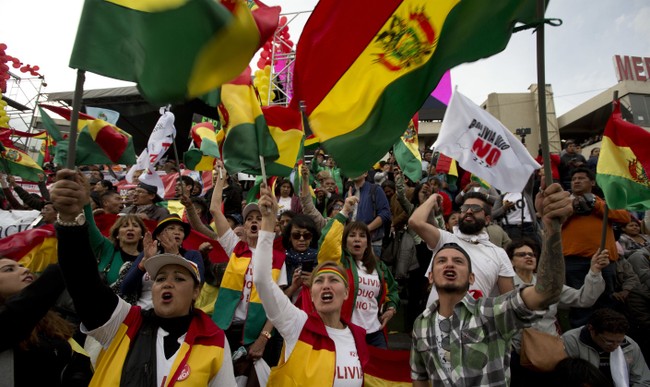
The people of Bolivia went to the polls yesterday, and they did something they haven’t done in decades: They rejected socialism.
Bolivia flirted with left-wing politics for decades, and in 2005, the South American country fully embraced it by electing Evo Morales as its new president. A union leader and the country’s first indigenous president, he campaigned on standing up for poor and marginalized people. He promised to combat poverty and discrimination. He had strong relationships with Hugo Chávez and Fidel Castro, which pretty much tells you all you need to know.
Initially, Morales’ policies delivered. He strengthened the economy and pulled many people out of poverty. His Movement Toward Socialism party gained strength and support, but as socialism does, it eventually failed Bolivia’s people. I’ve been reading up on it over the last few days, but I’ll spare you the entire detailed history of the past 19 or 20 years. The basic fact is that the country’s democracy gave way to authoritarianism, corruption, and economic decline.
Bolivians began rising up in 2016 when Morales changed the country’s constitution to ensure he could continue running for office. Despite the country voting against these changes, he pushed for them anyway, which cost him and the Movement Toward Socialism party any trust they had left with the population.
It took them nearly 10 years, but on Sunday, Bolivians made it clear that they are finished with Morales, socialism, and any candidate from the Move Toward Socialism party, including both the guys who’d been around for awhile and the fresh young faces who felt they could put lipstick on a pig — a pig called socialism — and make it appealing to voters.
None of the far-left candidates even reached double digits, while the three pro-capitalism, market-friendly candidates crushed them. Center-right Senator Rodrigo Paz earned 32.18% of the vote, while conservative Jorge “Tuto” Quiroga earned 26.81%. A third right-wing candidate, businessman Samuel Doria Medina, earned 19.5% of the vote.
Paz, who was born in Spain, is the son of former Bolivian president Jaime Paz Zamora. He represents the Christian Democratic Party, and it’s been said that he’s built a political identity separate from his father’s. Quiroga served as Bolivia’s vice president during a portion of the 1990s and was president from 2001 to 2002. The industrial engineer spent a great deal of time in the United States during his life. He graduated from Texas A&M and worked for IBM for a while. Medina, who found success in the cement business, was also educated in the United States and the United Kingdom, and he is a member of a party he founded himself, the National Unity Front.
Because neither man reached 40%, the two leaders, Paz and Quiroga, will face each other in a runoff in October. It’s not clear whom, if anyone, Medina might support.
No matter who wins, it’ll be a significant improvement in leadership for the people of Bolivia and, with any luck, a sign of the times. We’ve watched in recent years as Latin American countries like Argentina have rejected the left-wing policies that have plagued the region for decades. Hopefully, more will follow.
Enjoying our content? Please join us as we attempt to gain traction and serve as an alternative to the mainstream media.
Become a PJ Media VIP member and gain access to all of our content, plus other perks, like an ad-free experience and the chance to interact with our writers and other readers in the comments sections.
Just click this link to sign up. Use the code word FIGHT to get a 60% off discount — that’s less than $20 for the entire year!















